高中英语句型最全归纳
高中英语固定句型大全
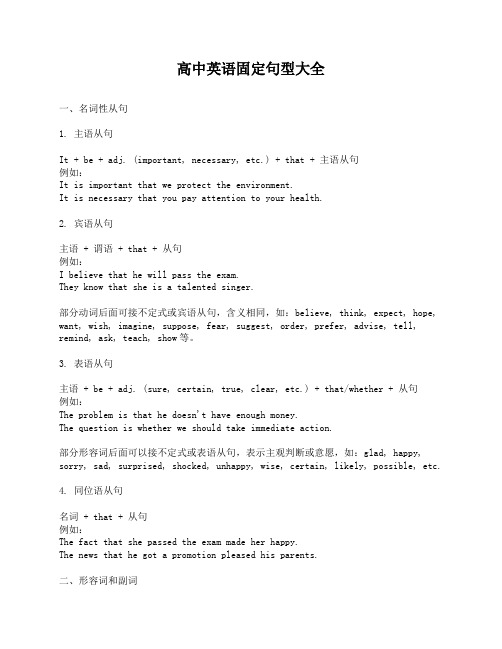
高中英语固定句型大全一、名词性从句1. 主语从句It + be + adj. (important, necessary, etc.) + that + 主语从句例如:It is important that we protect the environment.It is necessary that you pay attention to your health.2. 宾语从句主语 + 谓语 + that + 从句例如:I believe that he will pass the exam.They know that she is a talented singer.部分动词后面可接不定式或宾语从句,含义相同,如:believe, think, expect, hope, want, wish, imagine, suppose, fear, suggest, order, prefer, advise, tell, remind, ask, teach, show等。
3. 表语从句主语 + be + adj. (sure, certain, true, clear, etc.) + that/whether + 从句例如:The problem is that he doesn't have enough money.The question is whether we should take immediate action.部分形容词后面可以接不定式或表语从句,表示主观判断或意愿,如:glad, happy, sorry, sad, surprised, shocked, unhappy, wise, certain, likely, possible, etc.4. 同位语从句名词 + that + 从句例如:The fact that she passed the exam made her happy.The news that he got a promotion pleased his parents.二、形容词和副词1. 形容词的比较级和最高级比较级:主语 + be (am, is, are) + 形容词比较级 + than + 被比较的对象例如:She is taller than her sister.This book is more interesting than that one.最高级:主语 + be (am, is, are) + the + 形容词最高级 + 名词例如:He is the tallest boy in his class.This is the most beautiful painting I have ever seen.2. 常用的形容词和副词beautiful, handsome, pretty, ugly, lovely, attractive, stunning, gorgeous, charming, cute, elegant, fashionable, stylish, glamorous, delightful, etc.good, great, excellent, wonderful, fantastic, fabulous, amazing, awesome, splendid, terrific, marvelous, etc.bad, terrible, awful, horrible, unpleasant, etc.expensive, cheap, reasonable, affordable, etc.fast, slow, quick, rapid, swift, etc.loud, quiet, noisy, etc.hard, easy, difficult, challenging, simple, complicated, complex, etc.high, low, tall, short, long, big, small, huge, tiny, etc.young, old, new, ancient, modern, etc.3. 形容词和副词的用法形容词可修饰名词,也可作表语副词一般修饰动词、形容词或其他副词三、倒装句1. 完全倒装句在以下情况下要使用完全倒装句:a) 句首为表示地点、方式等的介词短语时例如:Under the tree were two cats.In this way, we can solve the problem.b) 句首为表示方位的副词或介词短语时例如:Here comes the bus.Out rushed the students.c) 句首为表示否定、副词only、hardly, seldom, never等时例如:Never have I seen such a beautiful sunset.Not only does he play the piano well, but he also sings well.d) 句首为so, neither, nor时例如:So busy was he that he forgot to eat lunch.Neither do I like English, nor do I like math.2. 部分倒装句在以下情况下要使用部分倒装句:a) 句首为表示条件的介词短语时例如:Should you need any help, please let me know.Had I known your address, I would have sent you a postcard.b) 句首为表示时间的介词短语或副词短语时例如:At no time should you give up your dream.On no account can he stay out late.四、虚拟语气1. 条件句中的虚拟语气a) “与事实相反的条件句”:如果对过去的情况进行虚拟,主句要用“动词的过去完成时”,从句用“动词的过去完成时”或“would/could/might + have + 过去分词”的形式。
高中英语常用重点句型总结(145条)
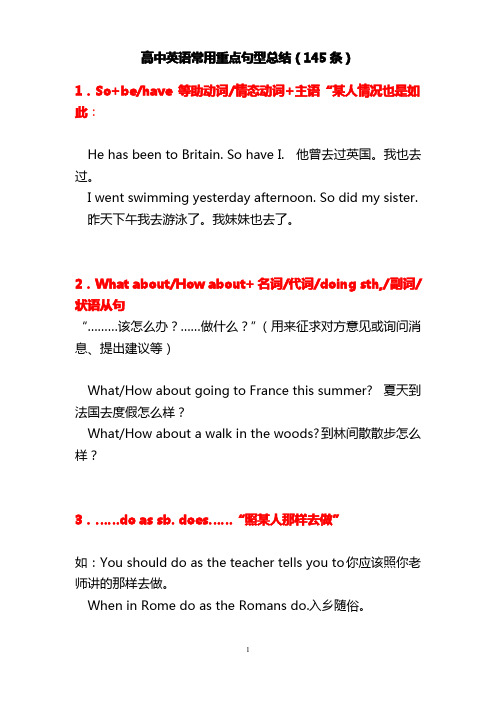
高中英语常用重点句型总结(145条)1.So+be/have等助动词/情态动词+主语“某人情况也是如此:He has been to Britain. So have I.他曾去过英国。
我也去过。
I went swimming yesterday afternoon. So did my sister.昨天下午我去游泳了。
我妹妹也去了。
2.What about/How about+名词/代词/doing sth,/副词/状语从句“………该怎么办?……做什么?”(用来征求对方意见或询问消息、提出建议等)What/How about going to France this summer?夏天到法国去度假怎么样?What/How about a walk in the woods?到林间散散步怎么样?3.……do as sb. does……“照某人那样去做”如:You should do as the teacher tells you to .你应该照你老师讲的那样去做。
When in Rome do as the Romans do.入乡随俗。
4.None of+名词/代词+do/does……“在……中没有任何一个做……”如:None of the telephones can work。
所有的电话都不能工作了。
None of them are/is interested in physics.他们中没有一个人对物理感兴趣。
5.Not+all+复数名词/不可数名词+are/is……“并非全部……”;“并不是所有的……”如:Not all the parts of the car will be made in the factory.并不是所有的汽车部件都在这家工厂制造。
Not all the students can pass the exam.并非所有的同学都能通过考试。
Not all factories here produce shirts.这儿的工厂不都生产衬衣。
高中英语常用短语及句型归纳
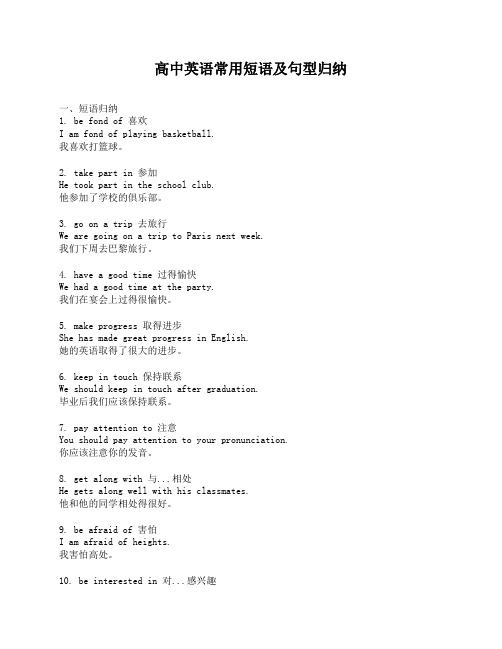
高中英语常用短语及句型归纳一、短语归纳1. be fond of 喜欢I am fond of playing basketball.我喜欢打篮球。
2. take part in 参加He took part in the school club.他参加了学校的俱乐部。
3. go on a trip 去旅行We are going on a trip to Paris next week.我们下周去巴黎旅行。
4. have a good time 过得愉快We had a good time at the party.我们在宴会上过得很愉快。
5. make progress 取得进步She has made great progress in English.她的英语取得了很大的进步。
6. keep in touch 保持联系We should keep in touch after graduation.毕业后我们应该保持联系。
7. pay attention to 注意You should pay attention to your pronunciation.你应该注意你的发音。
8. get along with 与...相处He gets along well with his classmates.他和他的同学相处得很好。
9. be afraid of 害怕I am afraid of heights.我害怕高处。
10. be interested in 对...感兴趣She is interested in learning Chinese.她对学习中文感兴趣。
11. take care of 照顾She takes care of her younger brother.她照顾她的弟弟。
12. be tired of 对...厌倦I am tired of doing the same thing every day.我厌倦每天做同样的事情。
(完整版)高中英语常用短语和句型归纳总结(完整版)
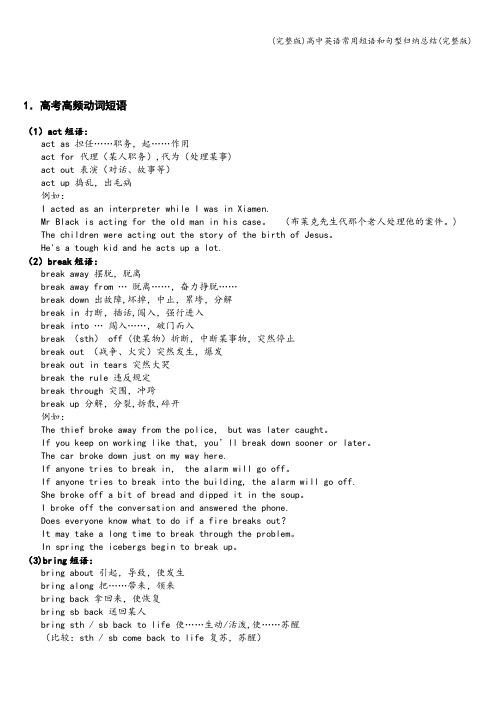
1.高考高频动词短语(1)act短语:act as 担任……职务,起……作用act for 代理(某人职务),代为(处理某事)act out 表演(对话、故事等)act up 捣乱,出毛病例如:I acted as an interpreter while I was in Xiamen.Mr Black is acting for the old man in his case。
(布莱克先生代那个老人处理他的案件。
) The children were acting out the story of the birth of Jesus。
He's a tough kid and he acts up a lot.(2)break短语:break away 摆脱,脱离break away from …脱离……,奋力挣脱……break down 出故障,坏掉,中止,累垮,分解break in 打断,插话,闯入,强行进入break into …闯入……,破门而入break (sth) off (使某物)折断,中断某事物,突然停止break out (战争、火灾)突然发生,爆发break out in tears 突然大哭break the rule 违反规定break through 突围,冲跨break up 分解,分裂,拆散,碎开例如:The thief broke away from the police, but was later caught。
If you keep on working like that, you’ll break down sooner or later。
The car broke down just on my way here.If anyone tries to break in, the alarm will go off。
If anyone tries to break into the building, the alarm will go off.She broke off a bit of bread and dipped it in the soup。
高中英语语法总结句式归纳
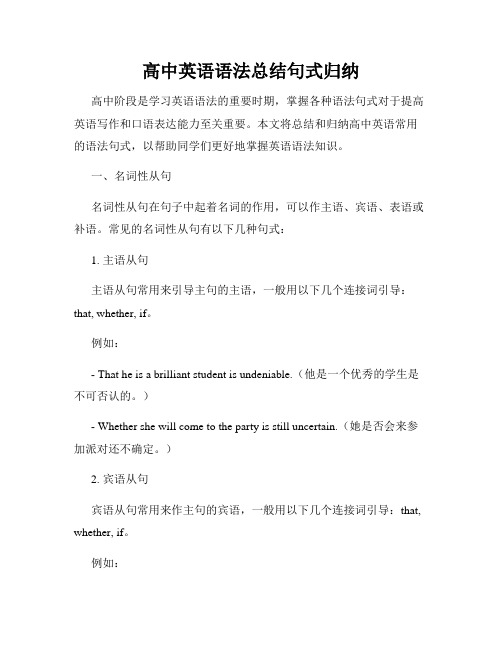
高中英语语法总结句式归纳高中阶段是学习英语语法的重要时期,掌握各种语法句式对于提高英语写作和口语表达能力至关重要。
本文将总结和归纳高中英语常用的语法句式,以帮助同学们更好地掌握英语语法知识。
一、名词性从句名词性从句在句子中起着名词的作用,可以作主语、宾语、表语或补语。
常见的名词性从句有以下几种句式:1. 主语从句主语从句常用来引导主句的主语,一般用以下几个连接词引导:that, whether, if。
例如:- That he is a brilliant student is undeniable.(他是一个优秀的学生是不可否认的。
)- Whether she will come to the party is still uncertain.(她是否会来参加派对还不确定。
)2. 宾语从句宾语从句常用来作主句的宾语,一般用以下几个连接词引导:that, whether, if。
例如:- I don't know if she can finish the task in time.(我不知道她是否能按时完成任务。
)- He asked me whether I had seen the movie.(他问我是否看过那部电影。
)3. 表语从句表语从句常用来作主句的表语,一般用以下几个连接词引导:that, whether。
例如:- My biggest concern is that we won't have enough time.(我最担心的是我们没有足够的时间。
)- The question is whether they will come to the meeting.(问题是他们是否会来开会。
)4. 同位语从句同位语从句用来解释或说明名词的内容,常用连接词that。
例如:- The fact that he won the competition surprised everyone.(他赢得比赛的事实让大家都感到惊讶。
高中英语常见句型结构总结
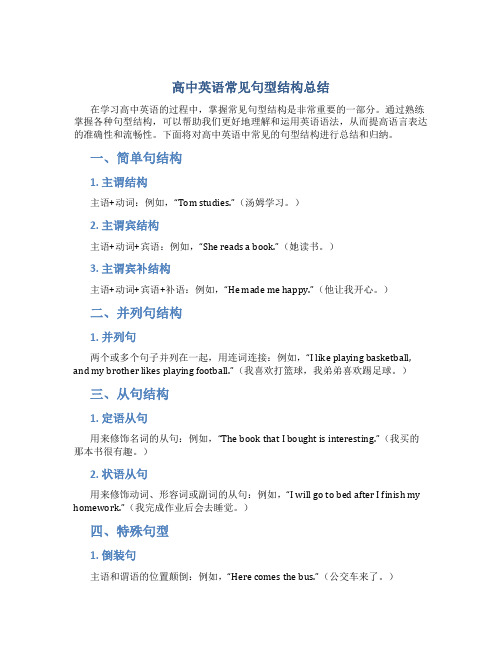
高中英语常见句型结构总结在学习高中英语的过程中,掌握常见句型结构是非常重要的一部分。
通过熟练掌握各种句型结构,可以帮助我们更好地理解和运用英语语法,从而提高语言表达的准确性和流畅性。
下面将对高中英语中常见的句型结构进行总结和归纳。
一、简单句结构1. 主谓结构主语+动词:例如,“Tom studies.”(汤姆学习。
)2. 主谓宾结构主语+动词+宾语:例如,“She reads a book.”(她读书。
)3. 主谓宾补结构主语+动词+宾语+补语:例如,“He made me happy.”(他让我开心。
)二、并列句结构1. 并列句两个或多个句子并列在一起,用连词连接:例如,“I like playing basketball, and my brother likes playing football.”(我喜欢打篮球,我弟弟喜欢踢足球。
)三、从句结构1. 定语从句用来修饰名词的从句:例如,“The book that I bought is interesting.”(我买的那本书很有趣。
)2. 状语从句用来修饰动词、形容词或副词的从句:例如,“I will go to b ed after I finish my homework.”(我完成作业后会去睡觉。
)四、特殊句型1. 倒装句主语和谓语的位置颠倒:例如,“Here comes the bus.”(公交车来了。
)2. 强调句强调句型的构造:例如,“It is Tom who won the game.”(赢得比赛的是汤姆。
)在学习英语句型结构时,要注意识别各种句型的特点,并结合实际情况进行灵活运用。
通过不断的练习和积累,我们可以逐渐提高对句型结构的把握能力,从而更好地运用英语进行交流和表达。
以上是高中英语常见句型结构的总结,希望对大家的学习有所帮助。
让我们一起努力,提升英语水平!。
高考英语常考的重点短语句型归纳
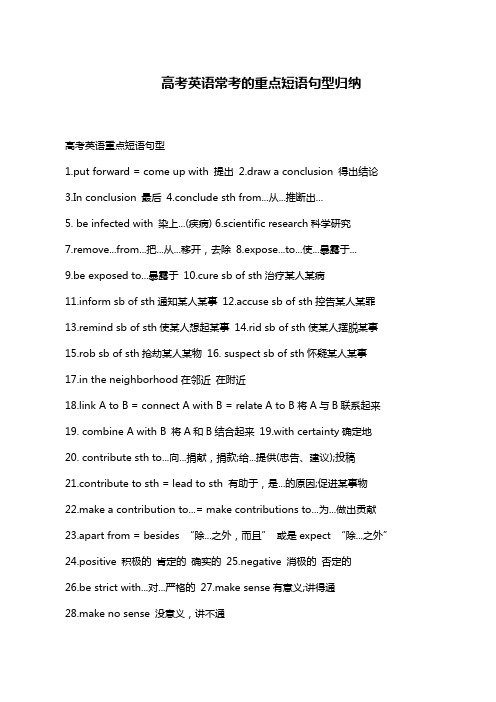
高考英语常考的重点短语句型归纳高考英语重点短语句型1.put forward = come up with 提出2.draw a conclusion 得出结论3.In conclusion 最后4.conclude sth from...从...推断出...5. be infected with 染上...(疾病)6.scientific research科学研究7.remove...from...把...从...移开,去除8.expose...to...使...暴露于...9.be exposed to...暴露于10.cure sb of sth治疗某人某病rm sb of sth通知某人某事12.accuse sb of sth控告某人某罪13.remind sb of sth使某人想起某事14.rid sb of sth使某人摆脱某事15.rob sb of sth抢劫某人某物16. suspect sb of sth怀疑某人某事17.in the neighborhood在邻近在附近18.link A to B = connect A with B = relate A to B将A与B联系起来19. combine A with B 将A和B结合起来19.with certainty确定地20. contribute sth to...向...捐献,捐款;给...提供(忠告、建议);投稿21.contribute to sth = lead to sth 有助于,是...的原因;促进某事物22.make a contribution to...= make contributions to...为...做出贡献23.apart from = besides “除...之外,而且”或是expect “除...之外”24.positive 积极的肯定的确实的25.negative 消极的否定的26.be strict with...对...严格的27.make sense有意义;讲得通28.make no sense 没意义,讲不通高中英语必背重点句子有哪些1.allow sb to do sth 允许某人去做某事(后接动词不定式)My father allowed me to go out for a walk after finishing my homework.2.asked sb (not) to do sth 叫某人做事某事(叫某人不要去做某事)My father asked me to study hard.He asked me not to swim alone.be asked to do sth 被叫去做某事/被邀请去做某事I was asked to have a dinner with them yesterday.3.be afraid to do sth 害怕做某事She is afraid to ask me questions.4.be afaid of doing sth 害怕做某事I am afraid of going out at night.5.be afaid of sth 害怕某物He is afraid of snakes.6.be amazed to do sth 对做某事感到惊讶He was amazed to meet the girl there.be amazed at sth 对某事感到惊讶they were amazed at the news.高中英语必背重点句子1. According to…依照/根据…….According to the newspaper, it#39;s a great movie. 根据报纸说,这是一部很棒的电影.2. Am I allowed to…我可以……吗Am I allowed to introduce our new manager Mr. Anderson to all of you请允许我介绍我们的新经理安德森先生给大家,好吗3. As matter of fact,…实际上……,…….As matter of fact,I don#39;t agree with you. 实际上,我不大同意你的看法.4.As far as I#39;m concerned/…就我而言,…….As far as I#39;m concerned, | think we should pay more attention to the safety of schoolchildren.就我而言,我认为我们应该更关注在校儿童的安全问题.5.As far as I know,...据我所知,…….As far as l know,he is not coming,but l may be wrong.据我所知,他不打算来,但我或许会弄错.6.As I just mentioned...正如我刚才提到过的,…….As I just mentioned, nobody should drop out of school unless they believe they face theopportunity of a lifetime. And even then they should reconsider.正如我刚才提到过的,任何人都不应该辍学,除非他们相信他们面临着一生中难得的机会,尽管那样,他们还需反复思量. [reconsider..重新考虑]7. As I see it,…在我看来,…….As I see it, he is not the right person for this position. 在我看来,他不是这个职位的合适人选.8. As is known to us all, ... 众所周知,……As is known to us all, Hong Kong is one of the financial centers of Asia.众所周知,香港是亚洲金融中心之一.9. As long as...只要….As long as we work together, we can make the impossible possible.只要我们一起努力,我们就能把不可能变为可能.10.But for...若不是因为……./如果没有…….But for your generous help, we couldn#39;t have finished the work so soon. 如果没有你的鼎力相助,我们不可能这么快完成工作的.。
高中英语句型大全汇总

以下是高中英语常见句型的大汇总:
1. 主语 + 不及物动词
例句:The rain stopped.
2. 主语 + 及物动词 + 宾语
例句:We love English.
3. 主语 + 系动词 + 表语
例句:I am a student.
4. 主语 + 及物动词 + 双宾语
例句:He bought me a gift.
5. 主语 + 及物动词 + 复合宾语(宾语 + 宾语补足语)例句:They heard him singing in the hall.
6. 主语 + 情态动词 + 谓语
例句:I must go now.
7. 主语 + 助动词 + 主要动词 + 表语
例句:He will be back next week.
8. 祈使句句型
例句:Please sit down.
9. 并列句句型(并列连词:and, or, but等)
例句:I like English, but I don't like maths.
10. 从属句句型(从属连词:when, because, if等)
例句:When he finished his homework, he went to bed. 以上是高中英语常见句型的汇总,希望对您有所帮助。
- 1、下载文档前请自行甄别文档内容的完整性,平台不提供额外的编辑、内容补充、找答案等附加服务。
- 2、"仅部分预览"的文档,不可在线预览部分如存在完整性等问题,可反馈申请退款(可完整预览的文档不适用该条件!)。
- 3、如文档侵犯您的权益,请联系客服反馈,我们会尽快为您处理(人工客服工作时间:9:00-18:30)。
常考句型1. be doing/ be about to do/be on the point of doing/had done…,when…(when:这时,强调一个动作的突然发生)1) I was walking along the river, when I heard a drowning boy cry for help.2) I was about to leave when it began to rain.3) I had just finished my test paper when the bell rang, announcing the exam was over.2. It was(not) +时间段+before +一般过去时“过了一段时间就……”It will(not)be+时间段+before +一般现在时“要过一段时间才会……”It is/ has been +时间段+ since…It was+点时间+ when…It was+时间状语+ that…(强调句)1) It was not long before he sensed the danger of the position.不久他就意识到他处境危险。
(动作已发生)2) It will be half a year before you graduate from the school.还有半年你才从这个学校毕业。
(动作未发生)3) It is 3 years since he worked here. = he left here.(since从句中的谓语动词若是延续性动词,要从这个动作结束的时候算起)4) It was 3 o’clock when they received the telephone.5) It was at 3 o’clock that they received the telephone.3. once…一旦……,表示时间和条件1) Once you start, you will never give up.2) Once you understand what the teacher explained, you will have no difficulty doing the work.4. the +比较级……,the +比较级……“越……越……”The more books you read,the more knowledge you will get.5. whether…or…无论是……还是……1) Whether the weather is good or bad, they will set off as they planned.2) Any person, whether young or old, has his own worth.6. 祈使句+or/otherwise +结果句或祈使句+ and +结果句1) Stop doing such a foolish thing, or you will be punished in time.2) More effort, and the problem would have been settled.7. every time/each time/next time/the first time/any time等短语引导时间状语从句,表示“每当,每次,下次,第一次,任何时候”。
1) Every time you meet with new words while reading, don’t always refer to your dictionary.2) Next time you come, do remember to bring your son here.3) You are welcome to come back any time you want to.8. There is(no) need to do…There is(no)hope/chance/possibility of doing…There is(no)difficulty/trouble/point/delay( in )doing1) Is there any chance of our winning the match?2) There is no point in discussing the problem again.9. it 强调句:基本构成形式:It is/ was +被强调部分+ who/ that+原句剩余部分I met him in the street yesterday afternoon.It was I who/that met him in the street yesterday afternoon.(强调是我,不是别人)It was in the street that I met him yesterday afternoon.(强调是在大街上,不是在别的地方,强调的是地点,但不用where)It was yesterday afternoon that I met him in the street.(强调是昨天下午,不是在别的时候,强调的是时间,但不用when)10. not... until直到……才1) The villagers didn’t realize how serious the pollution was until all the fish died in the river.2) It was not until all the fish died in the river that the villagers realized how serious the pollution was.(强调句)3) Not until all the fish died in the river did the villagers realize how serious the pollution was.(倒装句)11. not only…but(also)…引导并列结构:作主语时,谓语动词与邻近的一个主语保持一致。
Not only the teacher but also the students have their eyes examined regularly.not only... but (also)…引导并列句时,not only引导的部分置于句首时要部分倒装。
1) Not only was everything he had taken away, but also his German citizenship was taken away.2) Not only should we students study hard, but also we should know how to enjoy ourselves in our spare time.12. would rather +从句(从句要用虚拟语气,即从句中谓语动词用一般过去式,表示现在或将来的愿望;从句中谓语动词用过去完成市,表示对过去的愿望)1) I’d rather you posted the letter right now.我想让你现在就把信寄出去。
2) I’d rather I hadn’t seen her yesterday.我情愿昨天没见到她。
13. so, neither/nor 引导得倒装表示“另一者也如此”及前者的情况也适用于后者,用so, neither/nor引导的倒装句,助动词的选择依据前一句的谓语动词。
1) He has finished his homework, so have I.2) My sister prefers coffee, so do I.3) John can’t ride a bicycle, neither/nor can I.若前句的谓语动词既有肯定又有否定形式时,或谓语动词不属于一类时,用It is/was the same with sb.或So it is/was with sb.1) He is a worker and he works hard, so it is with John.若后一句是对前一句所说的内容表示赞同或认可,则主语和谓语不倒装。
1) — It is cold today. — Yes. So it is2) — He visited Tokyo last week. — Yes. So he did.14. 倍数表达法:A+谓语+倍数+ the + n.(size/ height/ length…) + of BA+谓语+倍数+ as + abj. + as BA+谓语+倍数+ adj.比较级+ than BA +谓语+ adj.比较级+thanB + by +倍数1) This square is twice the size of that one. This square is twice as large as that one. This square is once larger than that one.2) This factory produced three times as many cars as they did 10 years ago.3) He is 3 years older than IHe is older than I by 3 years.15. as/with表示“随……进展”,as后面接句子,with后面接短语。
1) With the industry developing, the pollution is becoming more and more serious.2) As the industry develops, the pollution is becoming more and more serious.16. with的复合结构(作状语或作定语)with + n. + adj. (with可以省略)1) (With) the street wet and slippery, we had to ride our bikes slowly and carefully.Because the street were wet and slippery, …2) The students were listening to the teacher, (with) their eyes wide open.The students were listening to the teacher, and their eyes were wide open.with+ n. + adv. (with可以省略)1) He put on his coat hurriedly, (with) the wrong side out.with + n. + prep-phrase (with可以省略)1) The old man was seated in the sofa, (with) a pipe in his mouth.with + n.+ to do/to be done (动词不定式的动作还未进行)with + n.+ doing/being done (动词不定式的动作正在进行)with + n.+ done (动词不定式的动作已经完成或指n.所处的状态)1) With so many problems to settle, the newly-elected president is having a hard year.2) He was lying in bed, with his eyes fixed on the ceiling.3) With the temple being repaired, we can’t visited it.17. 以here, there, in, out, up, down, away等副词开头的倒装句(多用一般现在时表示正在进行的动作)。
